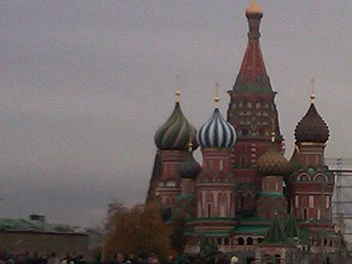image Wikimedia Commons
You might have missed it over the winter, but Russia achieved an important public health milestone that deserves applause: It enacted a national law that bans smoking in public places and restricts cigarette sales, joining a growing number of countries in making tobacco control a health priority.
The policy victory was a long time coming.
I recall, working in Russia in the mid- and late 2000s, the sense of gloom that prevailed about the poor health conditions of the population. Indeed, in a report that the World Bank prepared in partnership with the Russian Ministry of Health and the World Health Organization (WHO), we documented that Russians were “dying too young,” the main causes driving this phenomenon, and its enormous demographic, social and economic toll.
It was obvious then, as it is now, that a major culprit of the demographic and health decline in Russia is the widespread use of tobacco, which is linked with the country’s high rates of cardiovascular diseases (some of the world’s highest), many cancers and chronic lung diseases. According to the 2008-10 Global Adult Tobacco Survey (GATS), there are nearly 44 million smokers in Russia, and almost every Russian is exposed to secondhand smoke in bars and restaurants. One in three Russians is exposed to smoke in the workplace, and it is estimated that smoking claims 330,000-400,000 Russian lives every year.
While Russia ranks number one in smoking rates among countries surveyed, cigarette smoking is the single most preventable cause of disease and death in the country. And the future disease burden will be influenced by the already high rates of smoking in adolescents and young adults of both sexes in the country.
By the late 2000s, the rising cost to public health from smoking could no longer be ignored. From the highest offices in the Kremlin and the State Duma, to the Ministry of Health, regional governments and civil society, a consensus begun to emerge about the need to combat the tobacco epidemic as part of a broader effort to improve the poor health conditions of the population.
The stark reality underlying this shift was that mortality among Russian men had increased by 60% since 1991 -- four to five times higher than the European average -- contributing to the precipitous decline in life expectancy among males, to a low of 58 years in 2004 from the peak of 65 years in 1964, while women lived 14 years longer.
Although male life expectancy has risen in recent years to 63 years and life expectancy for women is now 75 years, poor health conditions, alongside declining fertility below replacement levels, have led to a significant decline in the total size of Russia's population, from 148 million in 1991 to 141 million in 2011. Annual productivity loss from smoking-related premature mortality was estimated to reach US$ 24.7 billion, or more than 3% of the GDP, in 2008. Additional losses from morbidity and health care expenditures related to smoking compound this loss.
The growing political and social momentum toward addressing Russia’s high burden of preventable illness contributed to the decision by the Russian government to ratify in April 2008 the Framework Convention on Tobacco Control (FCTC), a global treaty adopted by the 56th World Health Assembly in 2003, which has now been signed by 168 countries covering close to 90% of the world’s population.
And on February 23, 2013, Russian President Vladimir Putin signed a long-awaited, comprehensive law that will ban smoking in most public places and restrict cigarette sales in the world's second-largest tobacco market after China (Russia’s tobacco market was estimated to be worth US$22 billion in 2011). The law, which will ban smoking on municipal transport, at railway stations, in lifts, bus stations and administrative buildings, as well as in health facilities and schools beginning June 1, 2013, will come into full force in 2014, covering other venues such as ships, long-distance trains, train platforms, hotels, cafes and restaurants. It will also ban sales of tobacco products at street kiosks, restrict advertising, and set minimum prices for cigarettes, which now cost less than US$2.
On this year’s World Health Day, celebrated on April 7, the Russian people and the global health community should rejoice. The enactment and implementation of this momentous law puts Russia on the right side of public health history. Its measurable benefit in years ahead will be less ill health and disability, countless lives saved, and a more productive and healthy population.
To paraphrase Boris Pasternak in his timeless novel Dr. Zhivago, perhaps “Mother Russia is on the move, she can't stand still, she's restless and can't find rest” -- hopefully until the tobacco curse is overcome.
Follow the World Bank health team on Twitter: @worldbankhealth
Related
Economics of Tobacco Taxation in Russia
Adult Health in the Russian Federation: More Than Just A Health Problem




Join the Conversation